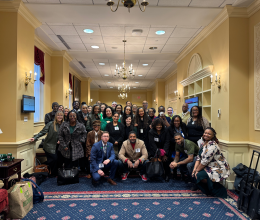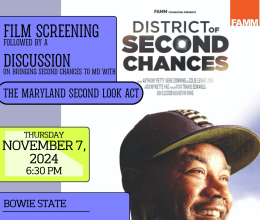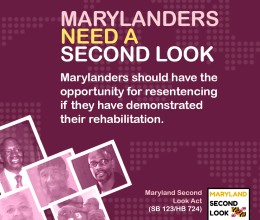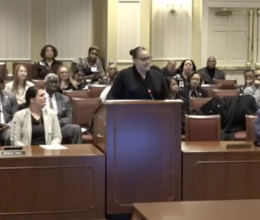
ANNAPOLIS, MD — After years of tireless advocacy by families, formerly incarcerated people, and community leaders, the Maryland General Assembly has passed the Second Look Act (HB 853), providing a long-overdue pathway for sentence reconsideration grounded in rehabilitation, not retribution.
As amended, the bill allows individuals who were convicted of certain crimes between the ages of 18 and 25—and have served at least 20 years of their sentence—the opportunity to petition the court to modify or reduce their sentence based on their demonstrated rehabilitation.
“This bill is an important step in giving deserving incarcerated Marylanders a chance to demonstrate who they’ve become,” said ACLU of Maryland Policy Director Yanet Amanuel. “It recognizes that people can change, especially after decades behind the wall. But it also represents a vital step towards justice, especially for those who may have encountered bias in their interactions with law enforcement, the courts, or corrections by ensuring that decades later, sentences can be reviewed based on our current understanding of fairness and racial justice.”
While the bill marks important progress, advocates remain deeply concerned about several harmful amendments added by the House Judiciary Committee. The final version excludes individuals serving life without parole (LWOP) and many other people who deserve a second look based on factors like age or the type of sentence received.
Maryland’s sentencing practices remain wildly inconsistent. Geography, politics, and prosecutorial discretion—not justice—often determine the length of a person’s incarceration. Baltimore County, for example, imposes LWOP sentences at a much higher rate than other parts of the state.
Together, these carve-outs severely limit the law’s impact. Despite the fact that many people serving extreme sentences were convicted under Maryland’s outdated “felony murder” rule—which allows for life sentences even for those who didn’t commit or intend to commit murder—some of these individuals, particularly those who received life without parole sentences or were above the age of 25, are now ineligible for review. The age group limitation also excludes criminalized survivors of domestic violence and people sentenced harshly for defending themselves.
“Excluding emerging adults serving LWOP contradicts the very spirit of the Second Look Act,” Amanuel continued. “These sentences were disproportionately handed to Black Marylanders through a system shaped by racism and discredited beliefs about who is capable of change. This bill could—and should—have gone further.”
Despite those limits, the passage of HB 853 marks a meaningful step toward confronting Maryland’s mass incarceration crisis. The state continues to lead the nation in the percentage of Black residents behind bars, and the length of sentences imposed on Black men. Still, for those who are eligible under this law, its passage creates a meaningful opportunity to be seen for who they are today, not just the mistakes they made decades ago.
"It is because of our unwavering love for our children, our spouses, our siblings and our friends behind the prison wall that this bill has passed,” said Magdalena Tsiongas, Founder of the Maryland Second Look Coalition. “We celebrate with those who have been waiting for this opportunity for decades, and wrap our arms around our loved ones who are still waiting for a second look. This is a bittersweet victory, but we remain committed to creating second chances because no human being is disposable.”
“Maryland’s history of harmful sentencing laws has devastated Black communities, and the Second Look represents a necessary step toward redemption and finally correcting those impacts,” said Martina Hazelton, Co-Founder and Executive Director of the Family Support Network. “While we celebrate this progress, we also recognize the many people left behind—and we won’t stop fighting for their chance to be seen and heard."
Advocates thanked coalition members, advocacy partners, families, and people who have returned home from prison for working to pass the Second Look Act. They also recognized the leadership of Delegate Cheryl Pasteur and Senator Charles Sydnor in sponsoring the bill, and the Legislative Black Caucus of Maryland for prioritizing it.
As the conversation continues, the ACLU of Maryland urges lawmakers to build on this foundation and expand opportunities for release rooted in fairness, dignity, and redemption.
We now call on Governor Moore to sign the Second Look Act into law.






